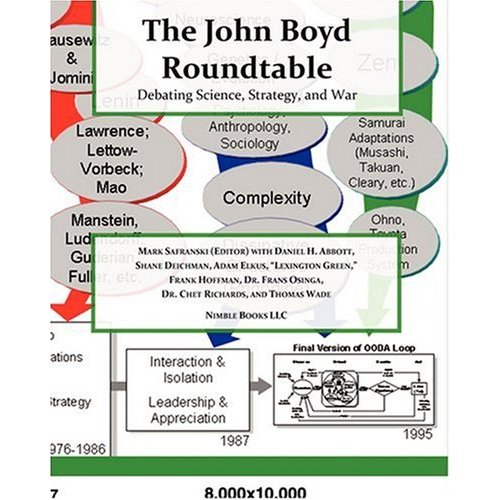Re-posted from Zenpundit.com at the request of my co-author Lexington Green:
The John Boyd Roundtable: Debating Science, Strategy, and War
This post has been a long time coming.
A while back, we had a a symposium at Chicago Boyz to discuss and debate the superb book Science, Strategy and War: The Strategic Theory of John Boyd by Colonel Frans Osinga. It was a great discussion from which I learned far more about the ideas of the iconoclastic military theorist John Boyd than I had ever previously considered. Not everyone involved was an admirer of John Boyd, a
 few were initially skeptical and we had one certified critic ( though I had tried to recruit several more). Overall, it was the kind of exchange that makes the blogosphere special as a medium when it is at it’s intellectual best.
few were initially skeptical and we had one certified critic ( though I had tried to recruit several more). Overall, it was the kind of exchange that makes the blogosphere special as a medium when it is at it’s intellectual best.
Shortly thereafter, via Dan of tdaxp I was approached by the publisher of Nimble Books, W.F. Zimmerman, who happened to be a military history buff and who was interested in working our loose online discussion of Dr. Osinga’s prodigious tome into a book. Initially, I was somewhat dubious but I warmed to the project at the urging of tdaxp and Lexington Green, and agreed to serve as the Editor and “herder of cats” in a project that would involve a large number of contributors with very different backgrounds and some fairly dense and esoteric material on strategic theory to digest and make comprehensible to a general reader.
A wonderful experience.
We had an excellent roster of contributors for The John Boyd Roundtable: Debating Science, Strategy, and War – Dr. Chet Richards, Daniel Abbott, Shane Deichman, Frank Hoffman, Adam Elkus, Lexington Green, Thomas Wade and Dr. Frans Osinga, who contributed several essays. Dr. Thomas Barnett sets the intellectual tone in the foreword after which the authors brought a wide range of professional perspectives to bear – cognitive psychology, military history, physics, strategy, journalism and, of course, blogging – in a series of articles that tried to explain the essence and dimensions of John Boyd’s contribution to strategic thought. Hopefully, we succeeded in creating an interesting and useful primer but the readers will be the ultimate judges, free to dispute our conclusions and offer contending arguments of their own.
I’d like to think that Colonel Boyd would have wanted it that way.
